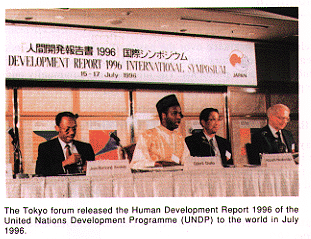Official Development Assistance (ODA)
1. New Development Starategy towards the 21st Century - Aiming for People-centered Development
"Place people at the centre of development and direct our economies to meet human needs more effectively." This is a passage in the Copenhagen Declaration adopted at the World Summit for Social Development in 1995. This concept of "people-centered development" has been formed gradually following the end of the Cold War and is now becoming a central concept existing behind the series of international conferences relating to development, such as the United Nations Conference on Environment and Development (the Earth Summit) held in Rio de Janeiro in 1992 and the International Conference on Population and Development (ICPD) held in Cairo in 1994.
Why is the concept of "people-centered development" becoming widespread? The development assistance in the past 50 years, on the whole, attained most significant results, supported partly by such factors as the progress in science and technology. The infant mortality rate has been lowered and the average life expectancy of the people of developing countries has been prolonged. The agriculture sector flourishing through the "green revolution" has helped to increase food production.
However, after the Cold War ended and the East-West confrontation disappeared, the striking scene which caught mankindõs eye has been a number of suffering people left behind by the wave of development -- people suffering from dire poverty and starvation, people unable to receive decent medical care and thus killed by curable diseases, children given no chance to develop their potential due to the lack of education, disaster victims and refugees kicked out of their own countries and compelled to manage to survive from one day to the next without hope for tomorrow due to the outbreak of ethnic conflicts.
Even many countries whose economy is dramatically growing are saddled with serious problems, such as the widening gap between the rich and the poor, the educational and medical problems of citizens who were left behind by economic growth, and environmental pollution caused by industrialization. As rapid globalization moves on, it is widely recognized that problems of developing countries could affect industrialized countries and, therefore, these problems need to be tackled on a global scale.
Under these circmustances, the international community has begun to focus its attention on individuals, superseding nation-to-nation and government-to-government relationships. Reflecting changes in perception and through various discussions in the international community, the concept of "people-centered development" has won worldwide support.
"Shaping the 21st Century: The Contribution of Development Co-operation" is the title of the New Development Strategy announced by the Development Assistance Committee (DAC) of the OECD in May 1996. It emphasizes the importance of a "new global partnership" under which the industrialized and developing countries will cooperate as partners in striving for common targets. The DAC proposes concrete numerical development goals, for the industrialized and developing countries to share, including the targets of poverty reduction, prevalence of primary and secondary education, and lowering of the infant and maternal mortality rates. It is worth noting that the idea of people-centered development is reflected on the DAC strategy.
Under this situation where a new trend is emerging concerning the world's development problem, the international community expects Japan to continue to take an initiative and to play a vital role with respect to development assistance. In order for Japan to respond to such expectation and increase its Official Development Assistance (ODA), the Japanese public should give its strong support, recognizing the significance of ODA for Japan and for the world. Since ODA projects are carried out overseas, the Japanese people do not have much opportunities to see and hear directly through their own eyes and ears how ODA is related to their daily lives. Needless to say, the Government must, therefore, make extra efforts to make up for this.
There is no doubt that the principal motive of ODA is the humanitarian consideration to assist developing countries. At the same time, however, ODA plays a vital role in serving Japan's national interest and contributing to the lives of the Japanese people in many ways.
(1) In the mutually interdependent world, the various problems emerging in the developing countries constitute a threat to the people living in the developed countries, including Japan. Japan's contributions to overcoming these threats result in securing the Japanese people's living in the end.
(2) Japan, as well as other industrialized nations, receives economic benefits from the growing economies in developing countries through expanding trade, investment, etc., as has been witnessed recently in East Asia.
(3) Resources-poor Japan depends on imports from developing countries for such basic goods as energy and food which are necessary for everyday life. For Japan, maintaining good relations with developing countries is vital for its national security.
Japan's prosperity depends on the development of the world. Japanese leadership in development assistance has just begun to take shape. If Japan were to perform such an important role continuously for 10, 20, or 50 years to come, the view that Japan and the Japanese people are contributing to the international community will take root. This is the way for the Japanese to improve their way of life in both the spiritual and material terms. This is the way that Japan should choose if it "desires to occupy an honored place in an international society..." (the preamble of the Constitution of Japan).


